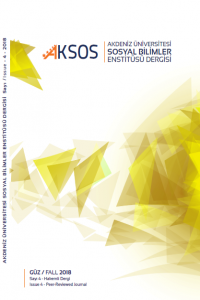Öz
Bugüne kadar toplumsal cinsiyet ve medya üzerine yapılan çalışmaların çoğu kadının
medyadaki sunumunu araştırmıştır. Oysaki medyada cinsiyet eşitsizliğinden bahsederken
sadece kadının sunumundaki sorunları irdelemek meseleyi sadece tek yönlü ele
almaktır. Bu çalışma erkek egemen medyada erkek söyleminin hegemonyası nedeniyle
cinsiyet eşitsizliği olduğu tezine ek olarak kadınların içeriğini oluşturduğu yapımlarda
erkeğin sunumunda da sorunlar olup olmadığını tespit etmek üzere yapılmıştır. Bu
amaçla bugüne kadar reyting oranları en yüksek olan ve üzerinden geçen yıllara
rağmen her tekrarı sosyal medyada top tweet olmayı başaran, kadın dizisi “Aşkı
Memnu”daki ana erkek karakterler incelenmiş ve onların egemen toplumsal cinsiyet
söylemini destekler biçimde üretildiği, kadın içerik üreticilerinin de toplumsal cinsiyet
söylemi bağlamında erkek meslektaşlarından farklı bir tutum sergilemediği sonucuna
varılmıştır.
Anahtar Kelimeler
Kaynakça
- Akyürek, Feridun (2004). Senaryo Yazarı Olmak, Mediacat, İstanbul.
- Atay, Tayfun (2004)“Erkeklik En Çok Erkeği Ezer”, Toplum ve Bilim, Güz.
- Berktay, Fatmagül. (2000). Tek Tanrılı Dinler Karşısında Kadın, Metis.
- Carrıgan, T. , Cennel ,B. , Lee, J., Towards. (2002). A New Sociology of Masculinity, Blackwell, Oxford.
- Connel, R.W. (2001) “Studing Man and Masculinity”, Resources For Feminist Research, Fall-Winter.
- Connel,R.W. (1995). ”Masculinities”, Polity Press , Oxford.
- Durkheım, E. , (1999). “Selected Writings in Social Work” , Routledge.
- Durkan, A., “Çocukken Öğrenilen Erkek/Kadınlık Kodları”.
- Hearn, J. (1996). “Is Masculinity Dead?”, Understanding Masqulinities, Open University Press ,Buckhingham.
- Horrocks, R. (2004). “Masqulinity In Crisis”, St Martin’s Press, New York.
- Kımmel, Michael S., (1987). “Rethinking Masculinity New Directions in Research”, Changing Men: New Directions in Research on Men and Masculinity, Sage Publications, Londra.
- Neuman, W.L. (2012) . Toplumsal Araştırma Yöntemleri: Nicel ve Nitel Yaklaşımlar, Yayın Odası, Istanbul.
- Oakley, Ann (2016) “Sex, Gender and Society”, Rouledge, New York.
- Petersen.,A. (1998). Unmasking The Masculine, Sage, Londra.
- Topbaş,S., “Kitle İletişim Araçlarının Söylem Biçiminde Kadının Yeri”, bianet.org
- Smıth, Roger, (1997)“İmgeler ve Eşitlik: Kadınlar ve Ulusal Basın”, Medya Kültür Siyaset, Bilim Sana Yayınları, Ankara.
- Unger, R., (1992). Crawford, M., Women and Gender, Mcgraham Hill, New York.
- Wınders, James A. (1991). “Writing Like a Man; Descartes, Science and Madness”, Gender Theory and the Canon, University of Wisconsin Press, Madison.
- Yıldırım, A., Şimşek, H., (2008). Sosyal Bilimlerde Nitel Araştırma Yöntemleri, Seçkin Yayıncılık, Ankara.
- Yüksek,Ö., (2009)”Başlangıçta Takı Vardı”, Atlas Dergisi, Doğan Yay., İstanbul.
- http://bianet.org
- http://www.medyatava.com
- http://tdkterim.gov.tr
- http://www.gata.edu.tt
Öz
So far, most studies on gender and media have studied the presentation of women
in the media. However, when talking about gender inequality in the media, the
problems of women’s presentation is only one side of the issue to examine. This
study is conducted to determine whether there are problems in the presentation of
men in the productions that the content is made by women in addition to the thesis
that gender inequality stems from the hegemony of male discourse in male dominant
media. For this purpose, the main male characters were examined in the series “Aşk-ı
Memnu” , which had the highest rating rates to date and its repeats managed to
be top tweet in social media despite passing of years, and it was concluded that
main male characters were created in support of dominant gender discourse, and
that women content producers could not take a different approach from their male
counterparts in terms of gender discourse.
Anahtar Kelimeler
Kaynakça
- Akyürek, Feridun (2004). Senaryo Yazarı Olmak, Mediacat, İstanbul.
- Atay, Tayfun (2004)“Erkeklik En Çok Erkeği Ezer”, Toplum ve Bilim, Güz.
- Berktay, Fatmagül. (2000). Tek Tanrılı Dinler Karşısında Kadın, Metis.
- Carrıgan, T. , Cennel ,B. , Lee, J., Towards. (2002). A New Sociology of Masculinity, Blackwell, Oxford.
- Connel, R.W. (2001) “Studing Man and Masculinity”, Resources For Feminist Research, Fall-Winter.
- Connel,R.W. (1995). ”Masculinities”, Polity Press , Oxford.
- Durkheım, E. , (1999). “Selected Writings in Social Work” , Routledge.
- Durkan, A., “Çocukken Öğrenilen Erkek/Kadınlık Kodları”.
- Hearn, J. (1996). “Is Masculinity Dead?”, Understanding Masqulinities, Open University Press ,Buckhingham.
- Horrocks, R. (2004). “Masqulinity In Crisis”, St Martin’s Press, New York.
- Kımmel, Michael S., (1987). “Rethinking Masculinity New Directions in Research”, Changing Men: New Directions in Research on Men and Masculinity, Sage Publications, Londra.
- Neuman, W.L. (2012) . Toplumsal Araştırma Yöntemleri: Nicel ve Nitel Yaklaşımlar, Yayın Odası, Istanbul.
- Oakley, Ann (2016) “Sex, Gender and Society”, Rouledge, New York.
- Petersen.,A. (1998). Unmasking The Masculine, Sage, Londra.
- Topbaş,S., “Kitle İletişim Araçlarının Söylem Biçiminde Kadının Yeri”, bianet.org
- Smıth, Roger, (1997)“İmgeler ve Eşitlik: Kadınlar ve Ulusal Basın”, Medya Kültür Siyaset, Bilim Sana Yayınları, Ankara.
- Unger, R., (1992). Crawford, M., Women and Gender, Mcgraham Hill, New York.
- Wınders, James A. (1991). “Writing Like a Man; Descartes, Science and Madness”, Gender Theory and the Canon, University of Wisconsin Press, Madison.
- Yıldırım, A., Şimşek, H., (2008). Sosyal Bilimlerde Nitel Araştırma Yöntemleri, Seçkin Yayıncılık, Ankara.
- Yüksek,Ö., (2009)”Başlangıçta Takı Vardı”, Atlas Dergisi, Doğan Yay., İstanbul.
- http://bianet.org
- http://www.medyatava.com
- http://tdkterim.gov.tr
- http://www.gata.edu.tt
Ayrıntılar
| Birincil Dil | Türkçe |
|---|---|
| Bölüm | Makaleler |
| Yazarlar | |
| Yayımlanma Tarihi | 30 Aralık 2018 |
| Gönderilme Tarihi | 15 Eylül 2018 |
| Yayımlandığı Sayı | Yıl 2018 Sayı: 4 |
Akdeniz Üniversitesi Sosyal Bilimler Enstitüsü Dergisi (AKSOS)


